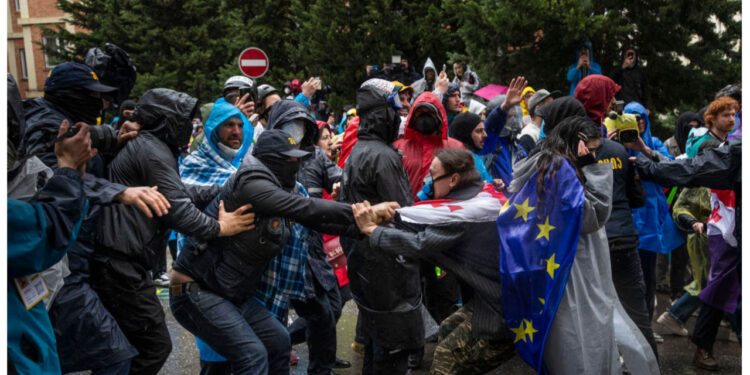Hundreds of young Georgians gathered outside the parliament building in Tbilisi on Monday following a night-long protest against a contentious law aimed at curbing “foreign influence.” The demonstrators argue that this legislation, which is believed to have been influenced by repressive Russian laws, will hinder Georgia’s aspirations of becoming a member of the European Union and undermine democratic principles. The country has been witnessing a wave of protests in recent weeks as opposition to the bill continues to escalate.
According to the Interior Ministry of Georgia, a total of 20 individuals, including three foreign citizens – two from the United States and one from Russia – were apprehended during the course of the morning.
The ruling party in Georgia, known as Georgian Dream, is determined to pass a bill that was previously withdrawn due to public opposition. The final hearing is scheduled for Tuesday, and the party argues that the proposed legislation will enhance transparency.
Non-governmental organizations and media outlets are required by law to register as “organizations pursuing the interests of a foreign power” if they receive more than 20% of their funding from abroad.
“We intend to remain here for as long as it is necessary,” stated 22-year-old Mariam Karlandadze during an interview with AFP, while legislators advanced the bill through a legal committee. She expressed her concerns about the law, stating that it would hinder their chances of joining Europe. Mariam emphasized that this was a lifelong aspiration of hers.”
Hundreds of riot police were observed by AFP journalists lining a street behind parliament, engaging in scuffles with protesters and making arrests. Despite authorities’ warning of possible arrests for those who blocked parliament, thousands of people defied the warning and gathered at the building’s gates. Even after the police carried out detentions, hundreds of protesters remained on the streets. The European Union, which granted Georgia candidate status last year, called on Tbilisi to investigate reported acts of violence and commended the Georgian people for their remarkable dedication to European integration.
“We firmly denounce any acts of intimidation, threats, or physical assaults targeting protesters, civil society activists, politicians, journalists, and media workers,” expressed Peter Stano, a spokesperson.
Ana Mirakove, a 26-year-old protestor, expressed her concern about the potential escalation of violence between the protestors and the police at any given moment.
According to AFP, she expressed her concerns about the safety of the situation, stating that nobody believes it will be safe. She strongly believes that Georgia should be a part of the European Union and have the freedom to determine its own future.
University students have taken the lead in the protests, declaring a strike and making a firm commitment to protest for the entire day. Some of these students even stayed overnight, draping themselves in both EU and Georgian flags as a symbol of their unity. Their spirits were lifted as stray dogs joined in the commotion, barking at the passing police cars, prompting cheers from the protesters.
Critics of Georgian Dream argue that the party is going back on its promise to align with Europe, suggesting that the proposed bill will align Georgia more closely with authoritarian Russia.
In 2012, Moscow implemented its own foreign influence law, which it has since used to exert pressure on individuals and organizations associated with the opposition.
“If this law is passed, we will gradually find ourselves resembling Russia. We are well aware of the unfortunate events that unfolded there and in Belarus. We are familiar with this kind of scenario,” expressed Archil Svanidze, a 26-year-old individual.
“We have always been aware of our connection to Europe. This understanding is not limited to just the younger generations like Gen Zs and millennials,” he explained. He also mentioned that his father had actively participated in the protest throughout the entire night.
Georgian Dream, the ruling party since 2012, has depicted the protesters as a violent mob and has justified the law as essential for Georgia’s sovereignty. Surprisingly, they reintroduced the bill in April, a year after it was withdrawn due to public opposition.
Bidzina Ivanishvili, the billionaire backer who amassed his wealth in Russia, has made allegations against non-governmental organizations (NGOs) of orchestrating a revolution and acting as puppets for foreign interests.
According to the party, the protesters were also accused of having connections to their arch-rival and former leader, Mikheil Saakashvili. Saakashvili, who had been detained on charges of abusing his office, was seen as a nemesis by the party.
“The irony lies in their constant criticism of the previous government for being corrupt and brutal,” pointed out 18-year-old Salome Lobjanidze, who chose to skip her university lectures on Monday to join the crowd outside parliament. She added, “If this proposal is approved, a significant number of individuals gathered here today might consider leaving the country.”










